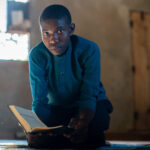While many churches in the West are in decline, less vibrant, and are gradually losing members, churches in Africa are growing, have great vigour, and are full of young men and women who love God passionately and are ready to become missionaries. God is calling the churches of Africa to be missionary-sending churches. Africa should be both an important launching point for sending workers and a think tank for missions issues. For the church in Africa, the twenty-first century is an age of mission opportunity, responsibility, and challenges.
The vitality of the church in Africa provides motivation to respond to the call of Jesus: “Therefore go and make disciples of all the nations, baptising them in the name of the Father and the Son and the Holy Spirit. Teach these new disciples to obey all the commands I have given you. And be sure of this: I am with you always, even to the end of the age” (Matthew 28:19-20).
For the African church, the 21st century is an age of mission opportunity, responsibility, and challenges.
Reaching the people of all nations involves meeting people whose cultures are often very different from ours. As we share the Good News of Jesus Christ, we have an opportunity to learn from these people. In this respect, missions is about two groups talking and learning from each other—missionaries and the people to whom they are sent. As missionaries, we are both giving and receiving. Missionaries from the West learned and benefited from their time in Africa. They lived with us, talked with us, and we learned from each other. Their encounters with African cultures helped shape them.
Africa’s Earliest Efforts In Missions
Some of the very earliest missionary work in West Africa was accomplished by Africans themselves, moving from Freetown back to their ancestral homes. However, before the second half of the twentieth century, it was difficult to find many examples of missionaries going from African nations to other nations and cultures. We had few biographies of African missionaries to inspire us. The primary understanding Africans had of missionaries was as white people. In Burkina Faso, the word for missionary was “American.”
African churches are actively sending missionaries to other parts of their own countries and other countries.
Fortunately, that has changed. Today, African churches are actively sending missionaries to other parts of their own countries to work among unevangelised people and to countries around the world—just as the early church did (Acts 13:1-43). These missionaries are exposed to new cultures, whether they are sent to another part of their own country or halfway around the world.
Although Africa’s leading missionary-sending countries are English-speaking—Nigeria and Ghana are two of the top twelve missionary-sending countries worldwide—French-speaking countries also send missionaries. For instance, churches in Burkina Faso and the Democratic Republic of Congo (DRC) have been sending missionaries for a number of years and have developed missionary training centres.
Our Continent Is Brimming With Potential
The church in Africa is able to take advantage of the opportunity to be a part of global missions because the many young people in the churches have a significant missionary potential. “The harvest is great but the workers are few,” said Jesus (Matthew 9:37). These men and women, bursting with energy and spiritual life, can be mobilised not only to be sent out, but also to support the missionary enterprise with their prayers and financial contributions. Africa has an emerging middle class that will increasingly be able to support missionary work. If we teach generosity wisely and motivate young people to have a missionary vision, the African church can both raise up and support African missionaries around the world.
The African church can both raise up and support African missionaries around the world.
The church in Africa is able to take great advantage of the opportunity to be a part of global missions because many African Christians have unusual resilience. We have lived through difficult situations such as war, poverty, famine and civil unrest. Resilience is an important quality when living in an unfamiliar culture. Africans are often able to deal with difficulties such as persecution, racism, and economic hardship. We know how to persevere until God gives results, especially when we are convinced that we have been sent by him.
Mission Will Mean Taking Risks
Please note the fine line between faith and presumption. Jesus taught the importance of planning and forethought before beginning a project (Luke 14:28-32). Western missionaries are often well organised in order to minimise their potential risks. In contrast, African missionary efforts may sometimes look like a chaotic, reckless, and disorderly endeavour.
One African sister left her country for another one without any assurance that her financial needs would be met. She had only one thing in her heart: the clear conviction that she had been called by God to go as a missionary. Often she would go several days without food. She regularly changed addresses because she had no stable home and was exposed to many dangers as a young woman. But she held on. She had the ability to live in complete and absolute dependence on God by faith.
Remember to take risks only after prayer and council.
Many western missionaries took similar risks when they were opening a new country or region for the gospel. But these risks can also be foolish, especially if you are going to an area with established churches. God can also provide support before you leave if he wants you to go! And, remember to take risks only after prayer and council. God may require more risks when going to an area with no churches.
Another West African brother raised support from his denomination and became a missionary with the very Western mission that planted his church. He went north to a country with very few churches. Today, he leads a mission station with both African and Western workers. God can also use well established world-wide missions to send African missionaries.
African Culture Creates Opportunities For Evangelism
Another strength African missionaries have is our community mind-set. Westerners tend to think of “me”, while Africans tend to think of “us.” Africans are usually less individualistic and socialise more easily than people from the West. Often missionaries from Africa are more easily able to enter countries that do not allow missionaries. They are more easily accepted than are Westerners. Some Africans living in North Africa have been able to build ties with local people with admirable ease. They have also had the joy of leading some of them to Christ. In the current tense global context, Africans are generally free of a burdensome colonial past.
Another strength African missionaries have is our community mind-set.
Because of our awareness of the supernatural and our bringing a spiritual dimension into our daily realities, prayer and being used by God for miracles are strengths of African missionaries. They know God is the one with the power to transform hearts. A common feature of all fast-growing student movements is that they have a culture of prayer and expecting the miraculous work of God.
Although such students are university intellectuals, they do not rely on rational apologetics that tend to give less importance to prayer and miracles. Missionaries from Africa are likely to depend on God in prayer, mobilise people to pray, and expect the miraculous in missionary work.
Because many Africans work outside their home countries, we should encourage believers who have professional training to work in academics, business, and professional capacities in countries that are closed to missionaries. Such believers can support themselves and make friends easily at their places of employment, just as the missionary Paul did. He made tents and worked with other tent makers as he travelled from city to city (Acts 18:1-3). It requires preparation and sophistication to be a foreign worker who respects local customs and laws and is also a witness for Jesus Christ.
Africa Has A Responsibility To The World
Africa has benefited greatly from the blessings of missionaries sent to our continent—as have people in other parts of the world. A former Chinese pastor from Beijing estimated that in the past two hundred years China has received more than twenty thousand foreign missionaries. He has challenged the Chinese church to send at least twenty thousand missionaries by 2030. This pastor said, “When we cross the mark of 20 000 missionaries sent into the world, we will consider ourselves a sending country because we owe the world a debt.”
Although some missionaries allowed themselves to be used for colonialist purposes, thousands died giving their lives to take the gospel and to show Christ’s love to Africa. Some missionaries who came to Ghana in the nineteenth century packed their belongings in coffins because they expected to die there. And close to 60 percent of these pioneers did die within the first two years of their stay, often killed by malaria. But in the few months they gave, they planted the seeds of the gospel.
The African church has a debt of gratitude to pay. It has a responsibility to give back its best.
The growth of Christianity in Africa from 9.4 percent of the population in 1910 to more than 50 percent in many African countries today is the fruit of God’s work through these missionaries. The African church has a debt of gratitude to pay. It has a responsibility to give back its best and, like the churches in China, to send missionaries into the rest of the world, including to countries in the West that are becoming post-Christian.
In addition to sending missionaries to other countries, Africa’s schools, universities, and seminaries must teach about missions. The church in Africa must contribute to the world’s theological understanding of Christian missions. And we need to strengthen the cross-cultural instruction in our African training centres for missionaries.
The primary reason for preparing and sending missionaries is Christ’s command to “go and make disciples of all nations” (Matthew 28:19-20). The church, the bride of Christ, wherever it is found and whatever its social or economic status, is under an obligation to fulfil the Great Commission. No believer is excluded.
Three Challenges To Sending Missionaries
1. Relative Inexperience When It Comes To Missions
The church in Africa does not always have experience in sending missionaries to people of other cultures, and we can face challenges arising from our limited experience. We may let missionaries go to other cultures without proper training or support from organisations. We need to learn from established missionary organisations, including ones from other countries. We need better support lines from churches to missionaries.
We need to learn from established missionary organisations.
In many African countries, churches have not yet defined clear policies for sending missionaries or established organisations for their support. We are still learning—and costly errors are sometimes made. The lessons learned from established missionary organisations will help future African missionaries to be more effective for Christ.
2. Culture Shock
African missionaries are not always well prepared to deal with differences in culture. We often attempt to transplant our own culture without taking time to understand and adjust to the culture of the mission fields, just as many pioneering Western missionaries did in Africa. For instance, some African missionaries in England have difficulty understanding that English people tend to be reserved, when we from Africa tend to be full of energy and outwardly expressive. Some of our African missionaries expect the English to behave the way we do after conversion. But even after conversion, the English will most likely remain reserved and less expressive than Africans.
3. We Lack Established Structures
Churches in Africa are not always well prepared to support missionaries with money or with care from their church leaders. They do not realise that missionaries in another country no longer have the church and extended family around them that they enjoyed in Africa. The support of others helps us cope in difficult situations, so we assume that such support and fellowship will be available to us in time of need. But missionaries frequently have no one to help them deal with difficulty. They are isolated. African missionaries can be thrown off balance quickly in the absence of adequate pastoral support. This deeply affects their ministry, especially during the early years of missionary work.
Missionaries frequently have no one to help them deal with difficulty. This deeply affects their ministry.
African missionaries do not always cooperate with one another or with missions and local churches in their host countries. Often missionaries are not easily accepted. Developing cooperation with other missionaries and existing local churches requires intentionality and perseverance.
Let’s Make The Name Of Christ Known
Africans are now leading in world-missions! Did you know that the world’s largest Christian student movement, the world’s largest Bible translation agency, and one of the world’s largest multi-national missionary sending agencies are being led by Africans? Now is the time for the church in Africa to seize the opportunity to help fulfil the Great Commission, to take on the responsibilities involved with the missionary task, and to face the challenges of developing an effective missionary effort within different cultures.
It’s time for the church in Africa to seize the opportunity to help fulfil the Great Commission.
We need to keep encouraging African missionaries to fully depend on God. Their intimacy with God and their conviction of being called by him are key factors in maintaining their spiritual passion on the mission field. Churches in Africa need to be more intentional about supporting missions. Their debt of gratitude should prompt them to give back to global missions. This requires better organisation, training, and cooperation. Human resources are abundant in Africa. However, the financial resources are not always as available to transform this missionary potential into reality. The church in Africa should encourage a generosity towards missions that will produce the financial base that is needed to become a major missionary sending continent.
May our desire be the same as the apostle Paul’s who said, “My ambition has always been to preach the good news where the name of Christ has never been heard” (Romans 15:20).
Points To Remember
- The church is becoming globalized. One church in Kenya partnered with a church in the United States to send and equip missionaries from both countries for a major church planning effort in a capital city in Europe. Look for opportunities to partner with African and non-African mission agencies. Both have unique knowledge and strengths. We can avoid mistakes and be more effective when we partner with others in both supporting and going as missionaries.
- Everyone in the church is called to give and pray for missions and missionaries. Find ways to become educated about the needs of specific nations and people groups.
- Many African students are being called by God to leave their countries and study abroad. Remember to go as an ambassador and missionary.
- It is easy to think about going as a “missionary” to cities or countries with great wealth and power. But Africans are often free to travel and work in poor countries where Western missionaries are not allowed to go. If God is calling you to be a missionary, first consider nations and ethnic groups where there are no or few churches.
- Prepare, prepare, prepare! If God is calling you to become a missionary, prepare in education, prepare your network to mobilise prayer and finance, and prepare in connecting to an appropriate church or agency to give the support you need for success.

The Africa Study Bible app is available on the Tecarta Bible App, the world’s best study Bible app, which is available to download on Google Play Store and Apple App Store.
Contact Oasis Regional Directors to order your Africa Study Bible:
- Regional Director East Africa: WhatsApp: +27 79 572 4877
- Regional Director West Africa: WhatsApp +234 809 111 1184














